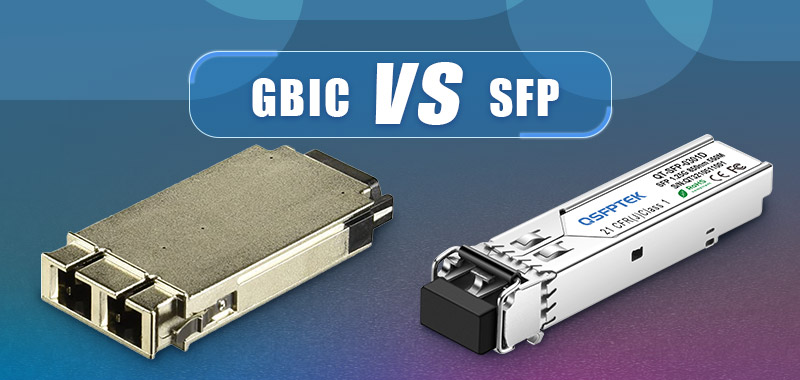GBIC vs SFP: Differences and Choose Guide
GBIC modules and SFP modules are input/output (I/O) devices for plugging into network switches or routers with gigabit Ethernet ports supporting 1000BASE-X optical fiber links. Do you know the difference between GBIC vs SFP? This article provides a comprehensive introduction to the GBIC module and SFP module and the differences between GBIC and SFP. We will also help you decide which one is right for your business. So, let's get started!

What is GBIC?
GBICs (Gigabit Interface Converters) are hot-pluggable interface devices that convert gigabit electrical signals into optical signals. The GBIC standard was first defined in 1995. GBIC modules are commonly used in gigabit Ethernet and Fiber Channel (FC) for connecting to transmission media like fiber optic cables and copper cables. GBIC became popular in the 1990s. The GBIC connector is designed in the form of SC duplex connectors to support reliable operation at 1Gbit/s.
The typical GBIC transceivers include 1000BASE-SX GBIC, 1000BASE-LX/LH GBIC, and 1000BASE-ZX GBIC. They cover short, long, and extended wavelengths. Their specifications are shown in the following table.
GBIC Module Options
What is SFP?
SFP (Small Form-factor Pluggable) is similar to the GBIC in function, a more compact hot-pluggable interface module used for electrical signal and optical signal conversion. Also, the typical speed of SFP is also 1 Gbit/s. 1G SFP transceivers support gigabit Ethernet, Fibre Channel, SONET, PON, and other communications standards. However, the size of SFPs are much smaller than the GBICs, so SFP is also known as mini GBIC SFP.
Similar to GBIC, the common SFP types include 1000BASE-SX SFP, 1000BASE-LX/LH SFP and 1000BASE-ZX SFP. The corresponding Cisco product models are GLC-SX-MM, GLC-LH-SM, and GLC-ZX-SM. Their specifications are shown in the following table.
SFP Module Options
GBIC vs SFP, What are the differences?
GBIC vs SFP connector
All GBIC modules use SC connectors, and SFP modules use LC or SC connectors. When installing a GBIC module, you need a duplex SC fiber. While SFP modules are used with LC UPC fiber as common as LC SFP optics are more popular.
GBIC vs SFP size
SFP is an upgraded version of GBIC. The most significant enhancement of SFP is the size. The SFP is smaller than half the size of GBIC, as shown in the following figure. A smaller size means higher density SFP ports are available on the same switch panel. It is the main reason why GBICs were replaced by SFPs.

GBIC vs SFP compatibility
The GBIC module has no variants, but SFP has variants such as SFP+ and SFP28, bringing speeds up to 10 Gbit/s and 25 Gbit/s. They have the same size as SFP, so SFP+ and SFP28 modules are backward compatible with SFP when the SFP module is plugged into SFP+ and SFP28 ports.
SFP or GBIC, How to Choose?
Firstly, if your switch or router is ready, how to choose between SFP and GBIC depends on your switch or router slots. SFP is not compatible with GBIC. Switches with only GBIC slots allow GBIC modules only, and so do SFP switches.
If you don’t have an existing switch or router, it is recommended to choose SFP equipment because SFPs have many advantages over GBICs, such as higher density, better interoperability and compatibility. Most importantly, the fact is that GBIC has been replaced by SFP in practical applications. GBIC has become thoroughly outmoded, the mini GBIC (SFP) is your right choice now.
Conclusion
GBIC and SFP are functionally similar, but SFP is more future-proof than GBIC in many ways, including smaller size, better compatibility and interoperability. It is consistent with the optical communication developing tendency of higher density, higher speed, and lower power consumption.
QSFPTEK provides a wide selection of SFP transceivers for your gigabit Ethernet and Fibre Channel applications. These small, modular optical interface transceivers offer a convenient and cost-effective solution for data center, campus, metropolitan area access, and storage area networks. If you have further questions on GBIC vs SFP or need any help with the SFP products, welcome to consult our support via [email protected].












